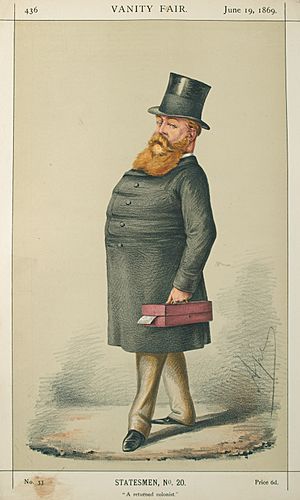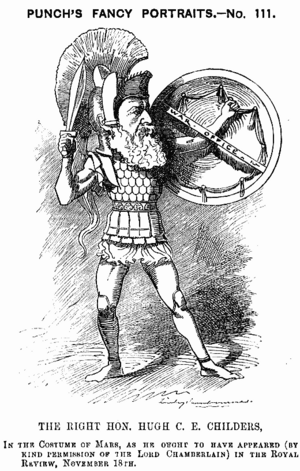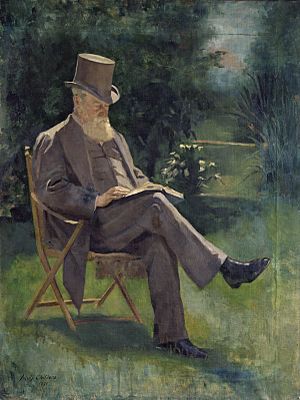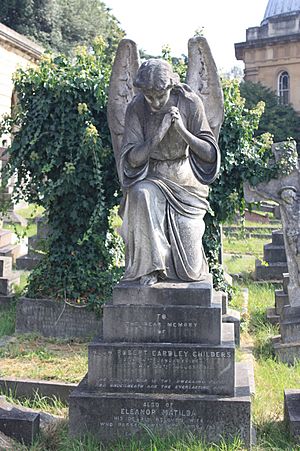Hugh Childers facts for kids
Quick facts for kids
Hugh Childers
|
|
|---|---|
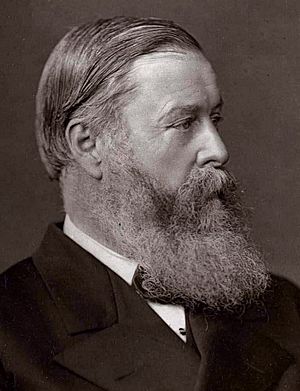 |
|
| Chancellor of the Duchy of Lancaster | |
| In office 9 August 1872 – 30 September 1873 |
|
| Monarch | Victoria |
| Prime Minister | William Gladstone |
| Preceded by | The Earl of Dufferin |
| Succeeded by | John Bright |
| Secretary of State for War | |
| In office 28 April 1880 – 16 December 1882 |
|
| Monarch | Victoria |
| Prime Minister | William Gladstone |
| Preceded by | Frederick Stanley |
| Succeeded by | Marquess of Hartington |
| Chancellor of the Exchequer | |
| In office 16 December 1882 – 9 June 1885 |
|
| Monarch | Victoria |
| Prime Minister | William Gladstone |
| Preceded by | William Gladstone |
| Succeeded by | Sir Michael Hicks Beach, Bt |
| Home Secretary | |
| In office 6 February 1886 – 25 July 1886 |
|
| Monarch | Victoria |
| Prime Minister | William Gladstone |
| Preceded by | R. A. Cross |
| Succeeded by | Henry Matthews |
| Personal details | |
| Born | 25 June 1827 London, UK |
| Died | January 29, 1896 (aged 68) London, UK |
| Political party | Liberal |
| Spouse | Emily Walker (d. 1875) |
| Children | 8, including Milly |
| Relatives | Erskine Childers (cousin) |
| Education |
|
Hugh Culling Eardley Childers (born June 25, 1827 – died January 29, 1896) was an important British politician. He was a member of the Liberal Party in the 1800s. He is most famous for trying to make changes at the Admiralty (which managed the navy) and the War Office (which managed the army). Later, as the person in charge of the country's money, his plan to fix a budget problem caused the government to fall.
Contents
- Early Life and Education
- Working in Australia
- Returning to Britain and Entering Politics
- Leading the Navy (First Lord of the Admiralty)
- From 1871 to 1880
- Secretary for War
- Chancellor of the Exchequer
- Home Secretary
- Retirement and the Childers Commission
- Family and Later Life
- See also
- Images for kids
Early Life and Education
Hugh Childers was born in London. His father was Reverend Eardley Childers. Hugh went to Cheam School and then studied at both Wadham College, Oxford and Trinity College, Cambridge. He finished his studies in 1850. He was very interested in ideas about free trade and how money grows.
After finishing college, Childers decided to move to Australia. He arrived in Melbourne, Victoria on October 26, 1850, with his wife, Emily Walker.
Working in Australia
In Australia, Hugh Childers joined the government of Victoria. He worked as an inspector for schools that belonged to different religious groups (Protestant and Catholic). He also helped people move to Australia. In 1852, he became a director for a railway company.
Childers became the auditor-general in October 1852. He was also chosen to be part of the Victorian Legislative Council, which helped make laws. In 1852, he suggested creating a university for Victoria. This led to the founding of the University of Melbourne in 1853. Childers became the first leader, or vice-chancellor, of the university. He also held other important government jobs before leaving Australia in 1857.
Returning to Britain and Entering Politics
Childers kept his role as vice-chancellor of the University of Melbourne until he moved back to Britain in March 1857. He received another degree from Cambridge that same year.
In 1860, he became a member of the House of Commons. This is where laws are made in Britain. He was a member for Pontefract and part of the Liberal Party. Within a few years, he joined the government. He became a Civil Lord of the Admiralty in 1864. Then, in 1865, he became the Financial Secretary to the Treasury, helping manage the government's money.
When William Gladstone became Prime Minister in 1868, Childers became even more important. He was made First Lord of the Admiralty. This meant he was in charge of the entire British Navy.
Childers wanted to save money and reduce the number of people working for the navy. He managed to get the navy's budget below £10 million, which was a big goal. He also changed how the Admiralty was run, giving himself more power.
However, Childers made a controversial decision about building a new warship called HMS Captain. He went against the advice of naval experts who said the ship was not stable enough. The Captain was finished in April 1870. Sadly, it sank on September 6, 1870. Childers' own son, Leonard, was a young officer on the ship and did not survive. After the ship sank, Childers faced a lot of criticism. He resigned from his position in March 1871 because of his health and the problems that followed.
From 1871 to 1880
After resigning, Childers spent some time traveling to get better. In 1872, he returned to government as Chancellor of the Duchy of Lancaster. The election that followed was important because it was the first time a secret ballot was used in a British parliamentary election. This meant people could vote in private.
Secretary for War
When the Liberal Party came back into power in 1880, Childers was asked to be Secretary for War. He didn't really want the job. In this role, he was responsible for cutting how much money was spent on weapons. This became a problem when Britain started fighting in South Africa in 1880 and then invaded Egypt in 1882.
Childers also made changes to the army that were not popular with some military leaders. On May 1, 1881, he introduced a set of improvements known as the Childers reforms.
Chancellor of the Exchequer
In 1882, Childers became Chancellor of the Exchequer, a job he had always wanted. This role meant he was in charge of the country's finances. He tried to change how government bonds worked in 1884, but his plan didn't succeed. However, it helped set the stage for a similar change later on.
In June 1885, he tried to fix a problem with the country's budget. He suggested increasing taxes on alcohol and income. But Parliament rejected his budget. The government was already unpopular because of events in Egypt, and this budget failure caused the government to lose power.
Home Secretary
In the election that followed in December 1885, Childers lost his seat for Pontefract. But he soon returned to Parliament as an independent member for Edinburgh South. He supported the idea of Home Rule for Ireland, which meant Ireland would have more control over its own affairs.
Childers then served as Home Secretary in 1886. This job involves managing internal affairs, like law and order. He had concerns about the money parts of the first Home Rule Bill for Ireland. His threat to resign helped remove those parts. However, the bill still failed to pass, and this caused the Liberal government to fall again.
Retirement and the Childers Commission
Hugh Childers left Parliament in 1892. His last important work was leading a group called the "Financial Relations Commission" in 1894. This group looked into money matters between Britain and Ireland. It became known as the Childers Commission.
The commission found that Ireland had been paying too much tax compared to the rest of the United Kingdom. This was about £2 or £3 million extra each year. Irish nationalists often used this report later to argue that Ireland needed more financial freedom.
Family and Later Life
Hugh Childers married Emily Walker in 1850. They had eight children, including a daughter named Emily "Milly" Childers, who became a painter. After Emily died in 1875, Childers married Katherine Anne Gilbert in 1879.
His younger cousin, Erskine Childers, was a famous writer. He also played an important role in Irish history. Erskine Childers' son later became the fourth President of Ireland.
Towards the end of his life, Hugh Childers became quite large. This led to him being nicknamed "Here Comes Everybody."
Hugh Childers passed away in January 1896, at the age of 68. He is buried in Brompton Cemetery in London.
See also
- Childers, Queensland, a town in Australia named after Childers.
- HMAS Childers (ACPB 93), an Australian ship named after the town.
Images for kids
 | John T. Biggers |
 | Thomas Blackshear |
 | Mark Bradford |
 | Beverly Buchanan |


